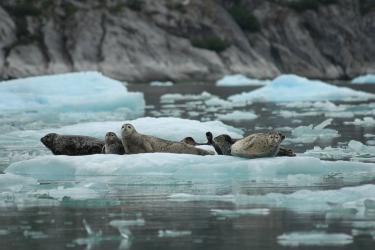The purpose of the DPEA is to evaluate, in compliance with the National Environmental Policy Act (NEPA), the potential direct, indirect, and cumulative impacts of conducting and funding fisheries and ecosystem research in the North Pacific Ocean and the marine waters off of Alaska.
NOAA Fisheries has prepared the DPEA under NEPA to evaluate several alternatives for conducting and funding fisheries and ecosystem research activities as the primary Federal action.
Additionally in the DPEA, NOAA Fisheries evaluates a secondary Federal action - also called a "connected action" under 40 CFR 1508.25 of the Council on Environmental Quality's regulations for implementing the procedural provisions of NEPA (42 U.S.C. 4321 et seq.) - which is the proposed promulgation of regulations and authorization of the take of marine mammals incidental to the fisheries research under the Marine Mammal Protection Act.
Additionally, because the proposed research activities occur in areas inhabited by species of marine mammals, birds, sea turtles, and fish listed under the Endangered Species Act (ESA) as threatened or endangered, this DPEA evaluates activities that could result in unintentional takes of ESA-listed marine species.
The following four alternatives are evaluated in the DPEA:
- No-Action/Status Quo Alternative – Conduct Federal Fisheries and Ecosystem Research with Scope and Protocols Similar to Past Efforts;
- Preferred Alternative – Conduct Federal Fisheries and Ecosystem Research (New Suite of Research) with Mitigation for MMPA and ESA Compliance
- Modified Research Alternative – Conduct Federal Fisheries and Ecosystem Research (New Suite of Research) with Additional Mitigation
- No Research Alternative – No Fieldwork for Federal Fisheries and Ecosystem Research Conducted or Funded by AFSC
The first three alternatives include a program of fisheries and ecosystem research projects conducted or funded by the AFSC as the primary Federal action. Because this primary action is connected to a secondary Federal action (also called a connected action under NEPA), to consider authorizing incidental take of marine mammals under the MMPA, NOAA Fisheries must identify as part of this evaluation "(t)he means of effecting the least practicable adverse impact on the species or stock and its habitat." (Section 101(a)(5)(A) of the MMPA [16 U.S.C. 1361 et seq.]).
NOAA Fisheries must therefore identify and evaluate a reasonable range of mitigation measures to minimize impacts to protected species that occur in AFSC research areas. These mitigation measures are considered as part of the identified alternatives in order to evaluate their effectiveness to minimize potential adverse environmental impacts. The three action alternatives also include mitigation measures intended to minimize potentially adverse interactions with other protected species that occur within the action area. Protected species include all marine mammals, which are covered under the MMPA, all species listed under the ESA, and bird species protected under the Migratory Bird Treaty Act.
NOAA Fisheries is also evaluating a second type of no-action alternative that considers no federal funding for fieldwork on fisheries and ecosystem research activities. This is called the No Research Alternative to distinguish it from the No-Action/Status Quo Alternative. The No-Action/Status Quo Alternative will be used as the baseline to compare all of the other alternatives.
Potential direct and indirect effects on the environment are evaluated under each alternative in the DPEA. The environmental effects on the following resources are considered: physical environment, special resource areas, fish, marine mammals, birds, invertebrates, and the social and economic environment. Cumulative effects of external actions and the contribution of fisheries and ecosystem research activities to the overall cumulative impact on the aforementioned resources is also evaluated in the DPEA for the three main geographic regions in which AFSC surveys are conducted.
Public Comment Period
NOAA Fisheries requests comments on the DPEA for Fisheries Research Conducted and Funded by the AFSC. Publication of this notice begins the official public comment period for this DPEA. Comments and information must be received no later than 30 days after date of publication in the Federal Register.
Comments on the DPEA should be addressed to: DPEA Comments, c/o AFSC Director’s Office, 7600 Sand Point Way NE, Building 4, Seattle, WA 98115. Comments via email may be sent to NMFS.AFSC.DPEA@noaa.gov. NOAA Fisheries is not responsible for email comments sent to addresses other than the one provided here.
NOAA Fisheries is not responsible for comments sent by any other method, to any other address or individual, or received after the end of the comment period. Comments received electronically, including all attachments, must not exceed a 10-megabyte file size. Attachments to electronic comments will be accepted in Microsoft Word or Excel or Adobe PDF file formats only. All personal identifying information (e.g., name, address) voluntarily submitted by the commenter may be publicly accessible. Do not submit confidential business information or otherwise sensitive or protected information.
A copy of the DPEA may be obtained by writing to the address specified above, telephoning the contact listed below (see FOR FURTHER INFORMATION CONTACT), or from the Related Links below. Documents cited in this notice may also be viewed, by appointment, during regular business hours, at the aforementioned address.
For further information contact: Dr. Daniel H. Ito, (206) 526-4232.
Additional Resources
- Published notice (2016-19002) filed with Federal Register on August 10, 2016
- Draft Programmatic Environmental Assessment for Fisheries Research Conducted and Funded by the AFSC
- Appendix A: AFSC Research Gear and Vessel Descriptions
- Appendix B: Draft Communication Plan
- Appendix C: Request for Rulemaking and Letters of Authorization
- Appendix D: Protected Species Mitigation and Handling Procedures for AFSC Fisheries Research Vessels



